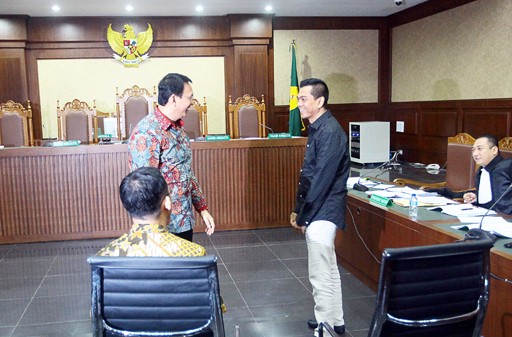Popular Reads
Top Results
Can't find what you're looking for?
View all search resultsPopular Reads
Top Results
Can't find what you're looking for?
View all search resultsAhok blames council for reclamation saga
Change text size
Gift Premium Articles
to Anyone
 VIP witness: Jakarta Governor Basuki “Ahok” Tjahaja Purnama (left) chats with defendant Mohamad Sanusi at the Jakarta Corruption Court on Monday during a break in the latter’s trial on graft charges involving reclamation projects in Jakarta Bay. Ahok and his aide Sunny Tanuwidjaja (seated with back to camera) were called by prosecutors to testify against Sanusi, who has been accused of accepting Rp 2 billion (US$152,000) in bribes from Ariesman Widjaja in relation to deliberations over the reclamation bills. (JP/Seto Wardhana)
VIP witness: Jakarta Governor Basuki “Ahok” Tjahaja Purnama (left) chats with defendant Mohamad Sanusi at the Jakarta Corruption Court on Monday during a break in the latter’s trial on graft charges involving reclamation projects in Jakarta Bay. Ahok and his aide Sunny Tanuwidjaja (seated with back to camera) were called by prosecutors to testify against Sanusi, who has been accused of accepting Rp 2 billion (US$152,000) in bribes from Ariesman Widjaja in relation to deliberations over the reclamation bills. (JP/Seto Wardhana)
J
akarta Governor Basuki “Ahok” Tjahaja Purnama has admitted some irregularities in the deliberation of a draft bylaw that regulates coastal areas and reclamation projects in the capital.
Testifying against Jakarta councilor Mohamad Sanusi at the Jakarta Corruption Court on Monday, Ahok revealed one such irregularity was that members of the City Council had not finalized the bylaw even though they had finished discussing it in their previous meetings.
“The developers were affected by [the delay] in the finalization of the bylaw,” Ahok told the panel of judges in a strong voice.
In March, Sanusi was allegedly caught red-handed by the Corruption Eradication Commission (KPK) receiving Rp 2 billion (US$152,000) from PT Agung Podomoro Land (APL) president Ariesman Widjaja, reportedly a bribe to speed up the draft bylaw’s finalization and to remove a clause that stipulated a 15 percent contribution figure from developers. Last week, the same court sentenced Ariesman to three years in prison for bribing Sanusi. APL is a developer in the reclamation projects
The governor said he did not know the exact reason why the City Council had delayed finalizing the bylaw. However, he noted that Muhammad Taufik, the City Council deputy chairman, who also leads the team that discussed the bylaw, disagreed with the amount of contribution developers should pay in the bylaw.
The administration wants developers to contribute 15 percent of their taxable property value (NJOP) but Taufik, Ahok said, wanted the contribution be reduced to only
5 percent.
In Monday’s hearing, Ahok also revealed that Taufik, while working on the draft with his subordinate Jakarta Development Planning Board (Bappeda) head Tuty Kusumawati, had told her that he had agreed to reduce the 15 percent figure to only 5 percent.
“I was very angry at the time because in every meeting I disagreed [with lowering the figure]. I told bu Tuty to return the draft to Taufik [and] this was crazy,” Ahok said.
Taufik is not implicated in
the case.
During the trial, defendant Sanusi objected to Ahok’s statement that councilors had all reached agreement on the bylaw’s drafting, saying that out of three meetings they had disagreed once.
The reclamation projects in the Jakarta Bay, which are being handled by nine companies — both private and city-owned — are part of a giant sea wall planned by the administration to prevent tidal flooding hitting the capital.
The 17 man-made islets are not meant to prevent floods but the administration said they were included in the plan so it could use developers’ contributions to fund the city’s infrastructure projects.
Ahok said in the hearing that the 15 percent contribution was deemed a beneficial percentage for the city’s infrastructure development.
Controversy, however, has surrounded the projects, ranging from the alleged bribery that implicated Sanusi, to protests from local fishermen who claim the islets’ construction destroys the environment and disrupts their work.
Ahok said the reclamation projects were parallel with the Presidential Decree No. 52/1995 and Bylaw No. 8/1995, which he said required developers to provide contributions to the city. He said the 15 percent figure, however, was his discretion as governor.
Ahok further recommended that prosecutors probe into the fact that former Jakarta governor Fauzi Bowo previously did not impose additional contribution requirements on developers when he issued reclamation permits. He said that move was not in line with the presidential decree.
Meanwhile, Ahok special staffer Sunny Tanuwidjaja, who was also present to testify, said developers objected to the 15 percent figure but they hesitated to tell Ahok. The governor said in the same court that the companies had agreed with the latter figure.









